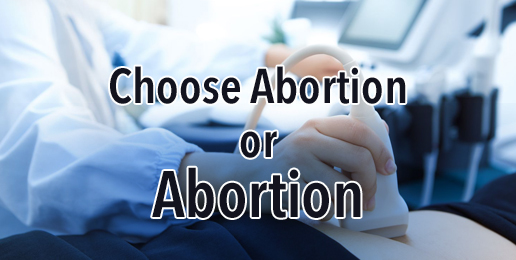
In recent articles, we’ve addressed how the very presence of legal abortion in society disempowers women, and recent studies show that up to 70% of women who have abortions feel at least somewhat coerced or pressured into the decision.

However, while boyfriends and family are common sources of this pressure, they aren’t the only ones.
The abortion industry itself—paragon of “choice” that it is—is sometimes guilty of pressuring women into abortion.
Listen to the story of Marie, who contributed her story to Silent No More Awareness’s testimony directory of women who have undergone abortions. [Disclaimer: Marie’s story is a self-report.]
When she discovered she was pregnant in her senior year of high school, she wanted to keep her baby, but facing severe pressure from her boyfriend (who threatened he wouldn’t support her and her child), her grandmother (who threatened that their relationship would end if she didn’t get an abortion), and her mother (who threatened to kick her out of the house if she kept her child), she made an appointment at an abortion clinic.
But it was obvious that the abortion clinic was not an advocate of free and unbiased choice. In Marie’s words,
“I told them how I wanted to keep my child . . . The abortion employees either fell silent or diverged the conversation. They did not provide me with any help or assistance to keep my baby. Instead, they threw a few pieces of paper at me that talked about government assistance.”
But that’s not all.
While supposedly doing their due diligence to give her an ultrasound, the abortion clinic actively withheld the information from her that she needed.
“When they provided the ultrasound, they purposely only showed me one image, and it was the image that was the farthest out, so the baby looked like a small dot. The abortion worker then used this to promote their agenda to ‘prove’ that my baby was really just a blob of tissue. I did not learn the truth about this ultrasound until years later.”
After Marie went through with the abortion, she began to severely regret the decision she had made in the absence of the truth.
“I began screaming, crying, and hitting the floor in my home as hard as I could while screaming at the ceiling above me to let me go back in time.”
Marie is not alone.
Leading pro-life researcher David Reardon, in his 1987 book Aborted Women: Silent No More, presented a study involving members of Women Exploited by Abortion (WEBA).
When they were asked, “Do you feel you had all of the necessary information to make the decision [to abort]?” he found that “93 percent insisted that they had little or none of the necessary information. Only 3 percent believed they had most or all of the necessary information” (p. 14).
Reardon found that, of the cases he studied, abortion counselors seemed particularly to blame.
“In sum, nearly 80 percent of the women surveyed believe that they had been denied pertinent information or had been actively misinformed by their counselors prior to their abortions.”
The most common grievances were that women had not been adequately informed about the development of their baby, not been adequately warned about the risks of the abortion procedure, or not been sufficiently told about the emotional pain that can follow an abortion (pp. 17–18).
Now, Reardon’s 1987 report was admittedly a particular study of women who had been harmed by abortion, not of the general population of women who had had an abortion.
But he and several other researchers found a similar trend in a famous study published in 2004, which did survey a broader population of women who had had an abortion.
The authors’ research found that 79.2% of the American women studied said they were not counseled on alternatives to abortion.
Think about that.
Four out of every five of those women made a choice without being counseled on the alternatives. That’s not a good track record for a procedure, an industry, and—to be frank—an ideology that is almost exclusively marketed under the magic six-letter word.
Think about it this way: in what other industry are escorts posted outside to walk customers into their facility as quickly as possible?
Grocery stores don’t escort shoppers across the parking lot and through the sliding doors; if the customer thinks it’ll be worthwhile to shop there, she’ll walk in of her own accord. The same goes for movie theaters, restaurants, and car dealerships.
(Sure, higher-end theaters and restaurants may have ushers or valets, but their purpose is to provide a sense of ease and luxury on your way in, not to “escort” you into their establishment as soon as possible. If you want to stop and talk with someone on the sidewalk outside of the theater, the valet is not there to hurry you along.)
But as someone who has ministered outside abortion clinics, I have noticed that some clinic escorts intentionally hurried women along if they looked likely to talk to sidewalk counselors.
They’d passively try to cut off a sidewalk conversation before it got too far, walk the woman to the door, and open it for her until she got inside. It’s almost as if a woman—who chose abortion yesterday when she made her appointment—is not allowed to change her mind and make a different choice today!
To be fair, clinic escorts are ostensibly there to protect women against aggressive abortion protestors. But to be fair all around, the sidewalk counselors whom I saw the escorts cutting off were not aggressive. They were simply trying to give women free resources and show them that care was right around the corner if they chose life.
But the choice to change one’s mind today didn’t seem to matter as much as the choice to schedule an abortion yesterday.
The abortion industry cannot market itself on the grounds of what it really does.
No one would walk into a self-confessed “pro-death clinic.” So they have to market themselves on an abstraction of what they do—choice—which appeals to everyone’s sense of autonomy.
But even this abstraction is not always accurate.
It’s almost as if the industry is scared of what women would choose if they truly had all the information.





















